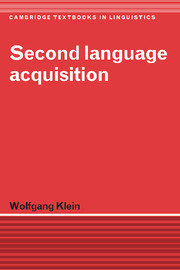Conclusion
Published online by Cambridge University Press: 05 June 2012
Summary
Research on second language acquisition has too short a history to supply conclusive evidence on any important question. However, my impression is that in some areas there are the indications of a firm foundation upon which we can build. In other areas we have little more than clouds under our feet. There are three concluding comments to be made.
One: From among the three groups of factors, namely propensity, language faculty (or language processor), and access, which determine the structure, the speed, and the end state of language acquisition, we have after all come to speak of only the last two (in Part II). This may partly reflect my own interests; but I feel that little can be said about the factors of propensity and their influence upon second language acquisition beyond what has been included in section 2.2. The rather extensive psychological research on motivation presents itself more favourably from a distance than in the kind of close-up required for working out suitable applications to second language learning. That is not to suggest that there is no need to investigate the factors of propensity in second language acquisition.
Two: It does not seem to me that second language research has supplied enough scientific evidence to serve as a solid foundation for second language instruction. But I do think that it will eventually be able to accomplish this task and that on some points it has made progress in this direction.
- Type
- Chapter
- Information
- Second Language Acquisition , pp. 167Publisher: Cambridge University PressPrint publication year: 1986

